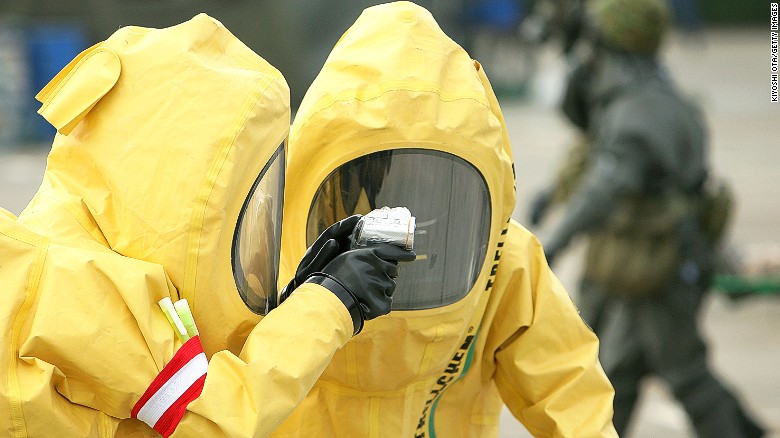Dirty bomb: Just how worried should we be as ISIS seeks ultimate threat?
Rescue workers take part in a trial in 2008 in Tokyo, Japan, to improve the city’s response to a “dirty bomb” attack.
Matthew Moran is deputy director, and Christopher Hobbs is co-director of the the Centre for Science and Security Studies at King’s College London, specializing on issues related to nuclear proliferation and security. The views expressed in this commentary are solely those of the writers.
Unsurprisingly, the prospect of ISIS
dabbling with unconventional weapons has been greeted with considerable
concern. The Iraqi government has appealed to the United Nations for
international help to “stave off the threat” in this regard and
Australian Foreign Minister Julie Bishop recently acknowledged that NATO
countries are deeply concerned by the situation.
But what can ISIS actually do with these newly acquired radioactive materials? What is the nature of the threat?
First off, it is important to emphasize
that radioactive sources of the type acquired by ISIS cannot be used to
create a nuclear bomb. These sources are mostly used for medical
research and treatments such as radiotherapy, and are completely
unsuited to the development of nuclear weapons.
This said, the harmful effects of these
sources, stemming from their chemical toxicity and radioactive
properties, can be exploited in other ways. If inhaled or ingested, for
example, these materials can be lethal. This was evidenced by the
poisoning of Alexander Litvinenko in 2006, when just a fraction of a gram of radioactive polonium proved enough to kill the former KGB officer.
Fortunately, achieving this type of
internal exposure on a large scale would prove enormously challenging
for a terrorist group. Consequently, attention has focused on the use of these materials by ISIS in a dirty bomb.
Combining radioactive materials with
conventional explosives, this is a bomb with an edge. A dirty bomb would
spread radioactive materials, contaminating the local area and any
individuals in the nearby vicinity. Crucially, however, this
contamination would be mostly external in nature and, if the attack was
promptly identified as being radioactive, decontamination of individuals
would be a relatively straightforward process. The exposure time of
anyone affected would be limited and the negative health effects
mitigated.
Indeed, with a dirty bomb, members of the
public are more likely to be harmed by the impact of the conventional
explosives than that of the radioactive materials.
This point was borne out by a series of
tests conducted over a four-year period by the Israeli Defence Forces
(IDF) in the Negev Desert. As part of this project – details of which
were recently published
by Haaretz — some 20 devices laced with radioactive materials were
detonated and their effects observed. The IDF concluded that a dirty
bomb attack poses little physical danger beyond the conventional blast.
From a psychological perspective, for
example, nuclear weapons are associated with death and destruction on an
enormous scale, and dirty bombs benefit from association with these
more sophisticated weapons simply because they incorporate radioactive
materials.
There is an important distinction to be
made between nuclear and radiological materials but this is often lost
in media reports and commentary on these issues. In any case, a dirty bomb detonated in a major urban center would be sure to cause widespread fear and panic.
The economic costs associated with a dirty bomb would also be considerable. A 2011 Congressional Research Service report, for example, suggested that the clean-up after such an attack could figure in the billions of dollars, if
detonated in a high-value area such as city center or port. Little
wonder, then, that the security of radiological sources has emerged as a
politically salient issue in recent years.
Ultimately, while the thought of ISIS
using dirty bombs to further its terrorist agenda is unsettling, the
threat should not be exaggerated, particularly when it comes to its
impact on public health. These are not the nuclear weapons that ISIS supposedly desires, and will do nothing to further the group’s ambitions in this regard.
